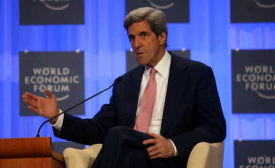middle east
Last week Tunisia seemed to be heading for the whirlpool that has sucked Egypt down. The secular opposition had taken to the streets to demand that the Islamist government resign. The National Constituent Assembly, charged with writing a constitution, had been shut down. The state was paralyzed. This week, all the warring parties are talking to each other. The spirit of compromise could evaporate, but my impression, from talking to people on all sides over the last few days, is that Tunisia has a decent chance of avoiding catastrophe. Why is that?
Al Jazeera now runs three television channels, including the newly-launched Al Jazeera America. The station is based in Qatar. But the kind of journalism Al Jazeera does is still a pipe-dream in that country. Northwestern University in Qatar journalism student Yara Darwish said of her countrymen, including her parents, “they actually have no clue of what journalism is. The culture in Qatar hasn’t allowed them to accept the idea of journalism. We are not a society that shares everything, that shares the news; we are a very private society.
Britain runs a secret internet-monitoring station in the Middle East to intercept and process vast quantities of emails, telephone calls and web traffic on behalf of Western intelligence agencies, The Independent has learnt. The station is able to tap into and extract data from the underwater fibre-optic cables passing through the region. The information is then processed for intelligence and passed to GCHQ in Cheltenham and shared with the National Security Agency (NSA) in the United States.
At some point, the post-revolutionary Arab states will emerge from the self-destructive madness that has them so tightly in its grip. While Egypt, Syria, Libya, and Tunisia deal with varying degrees of instability, the future should be kept in sight. The key to an improved future in the region is less political than it is economic. Democracy is a worthy goal, but it will be reached only slowly.

At some point, the post-revolutionary Arab states will emerge from the self-destructive madness that has them so tightly in its grip. While Egypt, Syria, Libya, and Tunisia deal with varying degrees of instability, the future should be kept in sight.
Egypt’s stock markets may be up and its bond yields down, a sign that many businesses and investors welcome the army’s iron grip. But multinationals are easing their way out of the violence that has killed 1,000 or more people in the past few days. They’ve been temporarily shutting down local operations and evacuating staff, with everyone from Turkish textile manufacturers to GM and Electrolux taking a break from the unsettled nation.
Foreign journalists are under attack in Egypt - they are accused of bias and of ignoring facts, and many of them have been detained, attacked and some even killed. Egypt's State Information Service released a statement to journalists on Saturday, detailing what it sees as media bias. "Media coverage has steered away from objectivity and neutrality" which has led to "a distorted image that is very far from the facts," the statement said.
Once, Adil Ibrahim worked as a translator with American soldiers, introducing them to Iraqi culture and the streets of Baghdad and trying to bridge gaps of understanding. Now, he’s one of them. Ibrahim, an Iraqi who came to the United States on a media scholarship in 2008 and then sought asylum, is now a U.S. citizen and member of the U.S. military. He’s even been deployed to Afghanistan.







